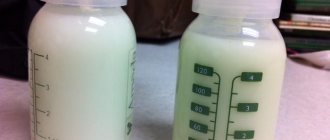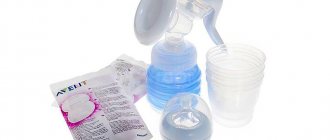Hello, dear readers.
We are sure that today’s topic will be of interest not only to established mothers (they already know what breastfeeding is and what its true value is), but also to expectant mothers, and perhaps even to those girls who are not very keen on having children. Views change, intentions change too, suddenly you change your mind, and you will already know where you can get useful information...
Human breast milk is a unique valuable product, recognized throughout the world as the best nutrition for a child. The advantages of breastfeeding over artificial feeding have long been proven by experts. Yes, mixtures cannot be compared, everyone knows that. But let’s not throw around general phrases; our task is to specifically understand what benefits breastfeeding brings to both: both the mother and her baby.
Nutritional value of milk
Breast milk contains a large amount of vital substances for the baby. Its unique composition includes vitamins and microelements, which are important for the full growth and development of the child.
Protein
The protein content in milk ensures the preservation of iron in the baby’s body and also prevents the development of pathogenic intestinal flora.
Vitamins
All necessary vitamins are contained in the optimal dosage for better absorption by the baby.
Water
Mother's milk contains water, which ensures the normal functioning of all the baby's organs.
Prebiotics
Their action is aimed at the formation of beneficial intestinal microflora.
Beneficial Antibodies
Together with breast milk, the child receives antibodies that form his immunity.
Digestive enzymes
Promote the breakdown of sugar and protein.
Benefits of breastfeeding for baby and mother
Protecting the child’s body and immunity from various infections
Human milk is more than a simple combination of nutrients. This is a living substance of great biological complexity, performing both active protective and immunomodulatory functions. It not only provides unique protection against infections and allergies, but also stimulates the appropriate development of the child's own immune system.
Mother's milk is sterile and does not contain pathogenic bacteria. If an infection enters the mother's body, special antibodies soon appear in breast milk that protect the baby from this infection. At the same time, for any illness of the child, including during diarrhea, breast milk provides him with additional protective factors that help him cope with the disease.
The effect of breast milk protects against diseases and helps children recover also in the second and third years of life.
Forming a close mother-baby bond
Only breastfeeding allows mother and baby to establish close, trusting relationships with each other. Mothers usually remember these moments of unity, tenderness and love with trepidation.
If the baby is bottle-fed, it is easier for the mother to give him to someone else to feed or simply put the bottle next to him so that the baby sucks on his own. Thus, the child receives less love and encouragement.
Development of the nervous system and formation of correct bite in a child
With prolonged breastfeeding, the child’s nervous system is fully formed, which significantly increases his intellectual potential in the future.
Babies who exclusively suck on their mother's breasts are less likely to encounter the problem of malocclusion, since the jaw apparatus develops absolutely normally, without pathologies.
Mom's health
If after giving birth the mother immediately actively puts the baby to the breast, her uterus contracts intensively, which serves as a prevention of postpartum complications. In addition, the figure will quickly return to its “pre-pregnancy” state if the mother breastfeeds for at least 9 months.
Benefit and convenience
In addition to the fact that breast milk comes to us completely free, it is also priceless in its essence. It is always ready for use, sterile, at the right temperature, the right composition and created for a specific baby.
Types of breast milk
There are three types of breast milk - colostrum, transitional milk and mature milk. They differ in their quality characteristics.
Colostrum
This is a substance that begins to be produced by the female body immediately after childbirth. It has a yellow tint and is viscous. Its use by a newborn baby is mandatory.
Colostrum contains a large amount of fats, antibodies and valuable microelements. It protects the child from the adverse effects of the environment, and helps the newborn to adapt most comfortably to the new environment.
Transition milk
It replaces colostrum 4-5 days after birth. The concentration of fats in it becomes less, but the nutritional value does not change.
Mature milk
2 weeks after birth, the female body begins to produce mature milk. It contains a large amount of water and a concentration of nutrients necessary for the further full development and growth of the child.
Benefits of breast milk
The benefits of breastfeeding for baby and mother are undeniable. When breastfeeding, a woman gives her baby exactly those microelements and nutrients that he needs at a certain period of his development.
For a child, mother’s milk is the basis for the proper formation of all organs and systems.
Here are all the benefits of breast milk:
- does not cause allergic reactions;
- helps normalize the child’s stool and form beneficial intestinal microflora;
- regulates the acid balance of the gastrointestinal tract;
- provides the necessary energy;
- forms the child’s immune system, providing his body with the necessary antibodies. Breastfeeding is a powerful protection for the baby from viruses and infections;
- ensures easy absorption of nutrients;
- influences the formation of correct bite;
- helps to establish psycho-emotional contact between mother and baby;
- reduces the risk of developing nervous tension and anxiety;
- gives the baby a feeling of comfort and security;
- is a balanced sterile product, with an optimal temperature for feeding a child.
For the mother, breastfeeding is no less important than for the baby.
During breastfeeding a woman:
- hormonal levels are normalized;
- the uterus contracts and quickly recovers after childbirth;
- the possibility of re-fertilization is minimized;
- the psycho-emotional background is stabilized, anxiety decreases;
- immunity is restored and strengthened;
- the risk of developing breast and ovarian cancer is reduced.
In short, the process of breastfeeding is important for both the child and the mother. It is impossible to obtain such invaluable benefits for a woman and baby with artificial feeding.
Benefits of Breastfeeding
Breastfeeding » Benefits of breastfeeding
In this section you will find useful articles about breastfeeding, its advantages and benefits.
In the first six months of life, the child should be exclusively breastfed, as it ensures normal growth and development of the child and has no equivalent substitute. A baby who receives breast milk will start his life healthy.
The first milk, “colostrum”, is very close in composition to the tissues of the newborn, therefore it is easily digested - it is “live” food that protects the child from infections and allergies. Colostrum acts as a laxative, clearing the baby's intestines of meconium (original, dark-colored stool rich in bilirubin), which prevents jaundice.
Breast milk contains more than 100 ingredients, most of which cannot be synthesized artificially; it fights for the child's health from the first sip.
Breast milk contains the most suitable proteins, fats, and milk sugar for the baby. The composition of breast milk changes from day to day, from month to month, from feeding to feeding, continuing to protect the baby’s health even in small amounts in the second year of life.
Children who are breastfed for a long time do not get sick not only at an early age, but also in the future; throughout their subsequent lives, they are less likely to suffer from gastrointestinal diseases, diabetes mellitus, atherosclerosis, hypertension, cancer, and blood diseases.
Breast milk protects children from iron deficiency anemia.
Breast milk contains enough different vitamins that babies who are exclusively breastfed for up to six months do not need vitamin supplements.
Breast milk contains a sufficient amount of water; Children should not be given water until they are six months old, even in hot climates, if they are receiving only breast milk.
When breastfeeding, close contact is established between mother and child, children cry less and develop quickly. In a family where a mother breastfeeds her child, love, peace and mutual understanding reign.
Long-term lactation is the best means of preventing maternal breast and ovarian cancer.
Exclusive breastfeeding for up to six months prevents new pregnancies.
Breastfeeding is not only healthy, but also convenient. Mother's milk is always sterile, fresh, and at the right temperature. You can sleep longer in the morning and take your baby into your bed at night.
Breastfeeding saves the family budget. There is no need to purchase formulas, juices, nipples, bottles, this saves energy and mother’s time.
It is recommended to feed children until 12 months or more. You can continue breastfeeding until 2 years of age or older.
News October 9, 2020 Our emotions as a reflection of health
October 9, 2020 Cataract: symptoms, causes, treatment
October 9, 2020 Save the apple of your eye
News archive
Possible problems
Breastfeeding experts say that all possible problems with breastfeeding arise due to improper latching technique. The most common:
- the appearance of cracks in the nipples;
- the occurrence of mastitis;
- pain in the chest area.
These problems can be solved if you learn how to properly put your baby to the breast and follow a few simple rules.
- Before breastfeeding, wash your breasts with boiled water.
- Alternately change breasts with each new feeding.
- Make sure that the baby captures not only the nipple, but also the areola with his mouth.
- The baby should be pressed tightly against the mother during feeding.
- If there are cracks in the nipples, after feeding, it is recommended to wash the breasts again and lubricate the damaged areas with antiseptic ointment.
- If lumps occur in your breasts, contact a mammologist who will prescribe treatment and teach you how to properly massage the mammary glands. This will prevent the seal from reoccurring.
- If there are lumps, frequently putting the baby to the sore breast helps. The baby, when making sucking movements, additionally massages the breast and eliminates blockage of the canals.
- Expressing milk stimulates increased milk production. If you have good lactation, then try to express breast milk less.
Until what age should a child be fed breast milk?
Doctors advise women not to interrupt breastfeeding for at least a year. The first year of a baby's life is the most important. During this period, the foundation of his health, mental and physical development is laid.

Some mothers feed their children until they are three years old or more. Experts insist that the maximum period of feeding should be no more than three years. This is explained by the fact that milk production uses reserves of nutrients and microelements accumulated during a woman’s pregnancy. During breastfeeding, they are depleted and the extraction of necessary substances from the mother’s body begins.
At the same time, after three years from the moment of birth, mother’s milk becomes less valuable and nutritious. Therefore, long-term breastfeeding is not a necessity, but a habit.
The benefits of breastfeeding for a newborn
We can talk forever about the benefits of mother’s milk for a child, but experts identify several main factors of benefit:
- Strong immunity. Breastfeeding helps a newborn baby speed up its adaptation to external conditions. Immune cells that make up mother's milk protect the baby's body from infectious diseases.
- Sound sleep and strength reserves. Mother's milk contains active substances that have a beneficial effect on the nervous system and normalize the baby's sleep.
- Full physical and mental development. Fatty acids contained in breast milk ensure the intellectual development of the baby.
- Emotional stability. When a woman puts her baby to her breast, a close psychological bond is formed between mother and child. This gives the baby a feeling of security, stability and peace.
- Good health. Breastfed babies are much less likely to have health problems. Such children are less susceptible to intestinal colic, allergic reactions and autoimmune diseases.
- No risk of obesity. When breastfeeding, the baby consumes as much food as he sees fit. At the same time, the risk of overfeeding is reduced to zero. Such children gradually gain weight and develop harmoniously.
- Timely teething. When a baby feeds on mother's milk, all the facial muscles are used. This allows you to speed up and facilitate the process of teething. Sucking the mother's breast helps strengthen the gums.
This is not the entire list of benefits of breastfeeding for a newborn baby.











